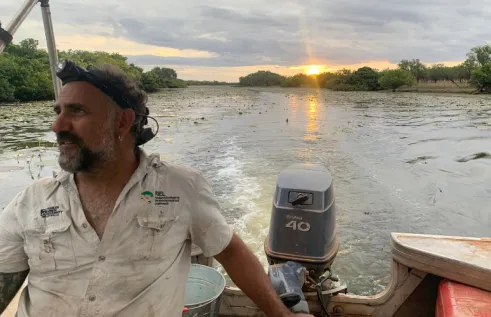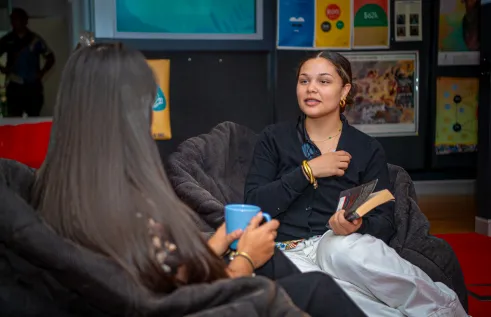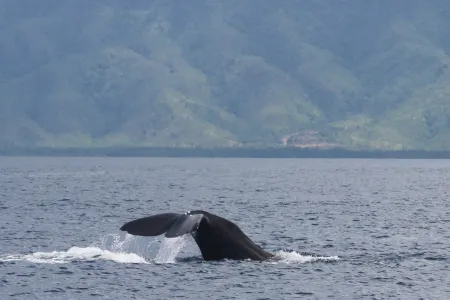RIEL seminar series
'Calling the wind': Blue whales, climate and whale tourism in Timor-Leste
| Presenter | Professor Karen Edyvane (National University of Timor-Leste) | |
|---|---|---|
| Date/Time |
to
|
|
| Contact person | E: RIEL.outreach@cdu.edu.au | |
| Location |
Savanna Room, Yellow 1 level 2 room 48 at CDU Casuarina Campus And online via Zoom (see below for Zoom link) All times are ACST |
|
| Open to | Public | |
Previous studies have identified the major economic potential for whale watching in the developing nation of Timor-Leste. We outline our efforts in developing a whale and dolphin ecotourism industry - working collaboratively with project partners (government, fishing communities, whale tour operators, eco-volunteers) - including annual cetacean monitoring, ‘citizen science’ and public education (ie. school resources, sightings App). We report on our findings (2016-2023) on cetacean diversity from a combination of dedicated aerial surveys and ongoing, boat-based and land-based (and drone-based) monitoring and incidental sightings and also traditional ecological knowledge (TEK) studies. We confirm the region as a global cetacean biodiversity hotspot, with at least 21 species recorded residing in or passing through Timor-Leste's waters. Including baleen whales, toothed whales, killer whales, and large and small dolphin species, including the rare, subspecies, dwarf spinner dolphin; and large, multi-species ‘superpods’ of oceanic dolphins. We confirm annual migrations of migratory large whales and oceanic dolphins (eg. pygmy blue whales, sperm whales, short-finned pilot whales, Risso dolphins). In particular, we confirm a major, annual migration of pygmy blue whales (South-East Indian Ocean population) through the Ombai-Wetar Passage – with migration strongly linked to the prevailing seasonal monsoonal climate, tides and wind- driven, seasonal upwellings and climate drivers (ENSO, IOD, MJO).
We propose that Timor-Leste arguably provides some of the best and most accessible, whale-watching in the world, particularly for large migratory whales. However, with growing major threats (ie. shipping, illegal fishing, marine pollution) and unregulated, rapidly-growing cetacean tourism, Timor-Leste urgently needs laws/regulations, ongoing research/monitoring and support/training to develop a sustainable whale watching industry – and protect and manage its globally-significant cetacean diversity. We also highlight the critical need for urgent transboundary conservation, international cooperation and population-level scientific collaboration for migratory species - particularly for pygmy blue whales and sperm whales.
Karen Edyvane (PhD, UAdel) is a marine scientist with extensive experience (>30 years) in coastal science, planning and management. Since her move to Darwin in 2006, her research interests have primarily focused on northern Australia and the Arafura and Timor Seas region - with a focus on coastal and marine ecosystems, sustainability, ecosystem management and environmental governance. For the past 10 years she has been working in Timor-Leste, as a researcher and international development consultant on a range of marine biodiversity, sustainability and livelihood development projects. She is currently a Visiting Professor at the National University of Timor-Leste, an Honorary Research Fellow with Charles Darwin University and an Associate Professor with the Australian National University.
Related Events

Trophic dynamics of free-flowing tropical rivers
Colton Perna's PhD research explores how river flows and flooding shape freshwater fish communities in tropical rivers, using fatty acids to track how hydrology influences food webs and nutritional pathways. His findings highlight the critical importance of river flow and floodplain connectivity in sustaining productive aquatic ecosystems.
Read more about Trophic dynamics of free-flowing tropical rivers
STATE OF THE DIS-UNION: Media Literacy in the age of AI
The CDU Library is hosting a free panel discussion featuring Northern Territory journalists who will discuss media literacy, truth, and storytelling in the AI era. Attendees can learn how AI is transforming media, ask questions, and improve their understanding of navigating information in today's landscape.
Read more about STATE OF THE DIS-UNION: Media Literacy in the age of AI
Why Cross‑Cultural Communication Matters in Indigenous-focused Research
A cross‑cultural research partnership grounded in respect, shared knowledge, and educational equity. Discover how collaboration shaped a transformative PhD journey.
Read more about Why Cross‑Cultural Communication Matters in Indigenous-focused Research
